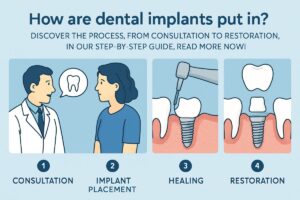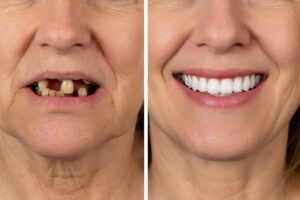Thinking about affordable teeth replacement? That phrase covers any option that restores missing teeth without breaking the bank — from removable dentures to fixed bridges to dental implants. Many patients ask whether dental implants are worth the cost. Common concerns include upfront price, durability, appearance, and recovery time. This article compares the main choices and gives practical steps to help you find an affordable, long-lasting solution.
Affordable Teeth Replacement Options: Quick Overview
Here are the typical options people consider when seeking affordable teeth replacement in New York and elsewhere:
- Removable dentures — Cost: $300–$3,000 per arch. Lifespan: 3–8 years. Best for patients on a tight budget or with widespread tooth loss.
- Fixed bridges — Cost: $1,000–$5,000 per unit. Lifespan: 5–15 years. Good when neighboring teeth are healthy enough to support a bridge.
- Dental implants — Cost: $1,500–$6,500+ per implant (single), higher for implant-supported bridges or full-arch solutions. Lifespan: 20+ years or lifetime with proper care. Recommended when long-term function and bone preservation matter most.
Removable Dentures: Pros, Cons, and Costs
Removable dentures are usually the lowest-cost option up front. They restore the look of teeth quickly and can be repaired or relined cheaply. Typical initial cost for a basic denture is low, but monthly or annual upkeep adds up.
Downsides include poor chewing efficiency, slipping, and progressive jawbone loss that changes fit over time. Those changes can mean frequent relines or replacements — a hidden long-term cost many patients don’t expect. Dentures are often recommended for immediate, low-cost replacement or when health issues prevent surgery.
Dental Bridges: Middle-Ground Solution
Dental bridges replace one or more adjacent missing teeth by anchoring a false tooth to neighboring natural teeth (abutments) or implants. They offer better chewing and appearance than dentures and are less expensive than implants when supporting teeth are available.
Caveats: preparing abutment teeth requires removing some enamel and can increase the risk of future decay or root canal treatment. Bridges need regular maintenance and typically last 5–15 years. Bridges are a good option when the adjacent teeth need crowns anyway or when the patient prefers a fixed, non‑surgical solution.
Dental Implants: Investment vs. Value
Dental implants replace tooth roots with a titanium post that supports a crown, bridge, or full arch. Options range from single-tooth implants to implant-supported bridges and full-arch implant restorations (often called “teeth‑in‑a‑day” or All‑On‑X solutions).
Implants have a higher upfront cost but deliver long-term value: they preserve bone, restore chewing power close to natural teeth, and usually last decades. Over a lifetime, implants often cost less than repeatedly replacing bridges or dentures. If you’re researching affordable teeth replacement, consider that many patients in New York find implant solutions become more economical over time because they reduce future repairs and replacements.
What “Affordable” Really Means: Upfront Price vs. Lifetime Cost
Affordable isn’t just the lowest sticker price. It’s the best balance of upfront cost, expected lifespan, maintenance needs, and quality of life. When comparing plans, ask for an itemized estimate that shows:
- Initial fees (surgery, lab, temporary prosthesis)
- Follow-up visits and prosthesis adjustments
- Estimated replacement or repair timeline
Also explore financing, third-party medical/dental loans, and phased treatment plans to spread cost. Insurance limits often cap replacements; implants may not be fully covered but can be financed. Advanced technology (guided surgery, in-house labs) can reduce complications and unexpected costs, improving long-term affordability.
Who Is a Good Candidate for Implants?
Most healthy adults can be candidates for implants, but several factors affect suitability:
- Bone volume and quality — enough bone is needed to support implants.
- Gum health — active gum disease should be treated first.
- Smoking and certain medical conditions (uncontrolled diabetes, immunosuppression) can lower success rates.
- Medications that affect bone healing (some osteoporosis drugs) require evaluation.
When bone is lacking, procedures like bone grafts or specialized S.M.A.R.T.™ grafting can create a stable foundation. Your dentist will evaluate health history and imaging to recommend the safest, most affordable path to implants.
How Modern Technology Can Make Implants More Affordable and Predictable
New tools reduce surprises and speed treatment:
- CBCT 3D scans show bone and nerve position for safer planning.
- Computer-guided surgery uses 3D-printed guides for precise implant placement.
- In-house milling and 3D printing allow same‑day or next‑day restorations, cutting lab fees and visits.
- Teeth‑in‑a‑day workflows can reduce the number of surgical visits and temporary prosthesis costs.
These advances can lower complication rates and reduce long-term maintenance costs, improving the overall affordability of implants.
Finding an Affordable Teeth Replacement Plan That Fits You
Practical steps to compare options and costs:
- Get itemized estimates from two or more providers.
- Ask whether the practice has an in‑house lab or uses outside labs (in‑house can be cheaper and faster).
- Request a written treatment timeline and warranty terms for restorations.
- Discuss phased treatment to spread costs (e.g., restore the most important areas first).
- Explore financing and whether your insurance offers any implant benefits.
Why Consider Advanced Implant Dentistry & Oral Restoration
Advanced Implant Dentistry & Oral Restoration brings decades of implant experience and a team that combines prosthodontic and surgical expertise. The practice uses a fully digital workflow and an in‑house lab to keep care efficient and predictable. Options like S.M.A.R.T.™ bone grafting, guided surgery, teeth‑in‑a‑day, and same‑day restorations help lower complications, visits, and long‑term costs — making implant care a more affordable long-term choice for many patients.
Next Steps / Call to Action
If you’re weighing affordable teeth replacement in New York, schedule a consultation to review your options and get a personalized, itemized estimate. Bring your medical history, dental insurance information, and a list of goals or concerns. A clear plan will show whether dental implants are the right, affordable long-term solution for you.





